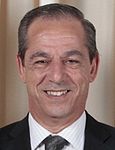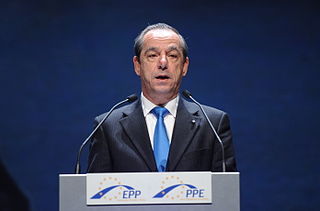
The politics of Malta takes place within a framework of a parliamentary representative democratic republic, whereby the President of Malta is the constitutional head of state. Executive Authority is vested in the President of Malta with the general direction and control of the Government of Malta remaining with the Prime Minister of Malta who is the head of government and the cabinet. Legislative power is vested in the Parliament of Malta which consists of the President of Malta and the unicameral House of Representatives of Malta with the Speaker presiding officer of the legislative body. Judicial power remains with the Chief Justice and the Judiciary of Malta. Since Independence, the party electoral system has been dominated by the Christian democratic Nationalist Party and the social democratic Labour Party.
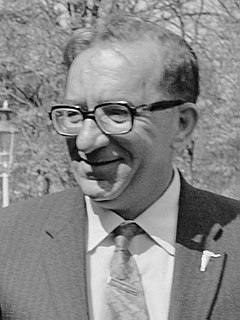
Domenico Mintoff, was a Maltese Democratic Socialist politician, architect, anti-colonialist revolutionary, and civil engineer who was leader of the Labour Party from 1949 to 1984, and was 8th Prime Minister of Malta from 1955 to 1958, when Malta was still a British colony, and again, following independence, from 1971 to 1984. His tenure as Prime Minister saw the creation of a comprehensive welfare state, nationalisation of large corporations, a substantial increase in the general standard of living and the establishment of the Maltese republic, but was later on marred by a stagnant economy and outbreaks of political violence.
Alfred Sant, is a Maltese politician and a novelist. He led the Labour Party from 1992 to 2008 and served as Prime Minister of Malta between 1996 and 1998 and as Leader of the Opposition from 1992 to 1996 and from 1998 to 2008.

Simon Busuttil, is a Maltese politician who was Leader of the Opposition within the Maltese Parliament. He also served as a Leader of the Leader of the Nationalist Party and a Member of the European Parliament for the Malta constituency.

Local elections were held in Malta on 12 March 2005. The Malta Labour Party won an absolute majority. Approximately 68% of the eligible voters turned up on election day. In Malta the vast majority of the electorate normally votes on election days, with turnout sometimes averaging above 92% for general elections.
Fifteen general elections have been contested since the granting of universal suffrage in Malta. Only 73 women have contested in these elections. The number of men, on the other hand, has exceeded 1000. The number of women contesting general elections has, however, increased over the years. In fact, the 1998 elections saw 24 women candidates participating, the highest number to date, with six of these getting elected, registering a 25 percent success rate.

General elections were held in Malta on 26 October 1996. Although the Malta Labour Party received the most votes, the Nationalist Party won the most seats. However, the Labour Party was awarded an additional four seats to ensure they had a majority in Parliament.
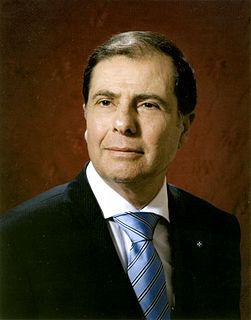
George Abela, is a Maltese politician who was President of Malta from April 2009 to April 2014.
The Constitutional Party was a pro-British political party in Malta. It had representatives in the Maltese Legislative Assembly and Council of Government between 1921 and 1945, and again between 1950 and 1953, forming a government between 1927 and 1930 with the support of the Labour Party. A splinter group, the Progressive Constitutionalist Party was represented in Parliament between 1962 and 1966. The party was very much centred on the figure of its long-time leader Lord Strickland, with party supporters colloquially known in Maltese as "Stricklandjani".
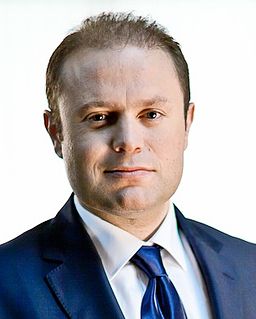
General elections were held in Malta on Saturday, 3 June 2017. The elections were contested by the Labour Party, led by Prime Minister Joseph Muscat, the Nationalist Party, led by opposition leader Simon Busuttil, and four other parties; making it the most parties fielding candidates since 1962. The result was a victory for the Labour Party, with 55% of the popular vote. Voter turnout reached 92%.

The European Parliament election of 2014 in Malta elected Malta's delegation to the European Parliament from 2014 to 2019. This was the third such election held in Malta. The elections were held on Saturday, 24 May 2014.
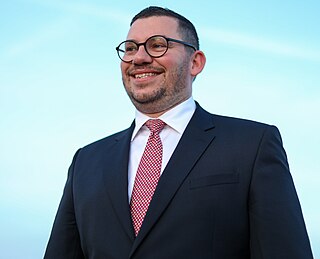
Cyrus Engerer is a Maltese politician, known for his public stands on Civil Rights and Malta's National Identity. He is the Prime Minister's Special Envoy to the European Union and also a candidate for the 2019 European Parliament Election on behalf of the Labour Party.

Marlene Farrugia is a Maltese Member of Parliament and founder and leader of the Democratic Party. She was formerly a member of the Nationalist Party, with whom she contested the General Elections in 1996 and 1998, and the Labour Party, with whom she was elected in 2008 and 2013, before resigning in 2015 and forming the Democratic Party in 2016.
Mark Anthony Sammut, is a Maltese politician and an electrical engineer. He is currently serving as the President of the Nationalist Party (Malta)'s Executive Committee. Sammut is also a Local Councillor in Gudja.




